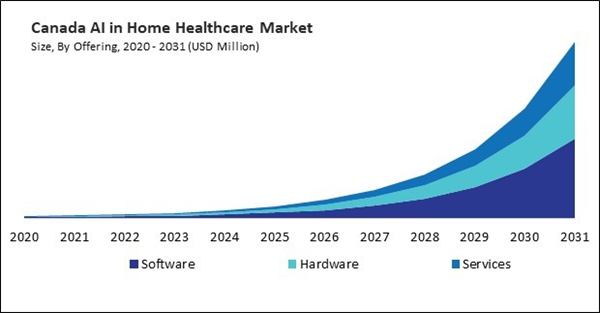The US market dominated the North America AI in Home Healthcare Market by Country in 2023, and would continue to be a dominant market till 2031; thereby, achieving a market value of $10,021.2 million by 2031. The Canada market is experiencing a CAGR of 55.3% during (2024 - 2031). Additionally, The Mexico market would exhibit a CAGR of 54.4% during (2024 - 2031).
The healthcare landscape is profoundly transformed by technological innovation, demographic shifts, and changing patient expectations. Integrating artificial intelligence (AI) into home healthcare delivery is among the most promising and impactful advancements. With its capacity to analyze vast amounts of data, learn from patterns, and make predictions, AI holds immense potential to revolutionize how healthcare is delivered and managed within the comfort and convenience of patients' homes.
Additionally, home healthcare, once primarily associated with post-hospitalization recovery and elderly care, has expanded to encompass a broader spectrum of services, including chronic disease management, preventive care, remote monitoring, and telehealth consultations. This evolution reflects a growing recognition of the benefits of delivering healthcare services in the home environment, where patients can receive personalized care, maintain independence, and avoid unnecessary hospitalizations or institutionalization.
Moreover, in Canada, the demand for home healthcare services is particularly pronounced due to the challenges posed by geographic dispersion, especially in remote and rural areas. Access to healthcare services can be limited in these regions, making home healthcare a preferred option for many Canadians. As per the data from Statistics Canada, in 2022, Canadians living in British Columbia (73.8%) and Newfoundland and Labrador (70.7%) were the most likely to have used a virtual consultation in the 12 months preceding the 2022 survey, while those living in Prince Edward Island (36.9%) and Quebec (37.6%) were the least likely to have done so. Therefore, the growing demand for home healthcare services in North America is expected to drive the demand for AI in home healthcare in the region.
Based on Offering, the market is segmented into Software (Application Programming Interface and Machine Learning Framework), Hardware and Services. Based on Technology, the market is segmented into Machine Learning, Natural Language Processing, Context-aware Computing, and Computer Vision. Based on Application, the market is segmented into Lifestyle Management & Remote Patient Monitoring, Patient Data & Risk Analysis, Virtual Assistants, Wearables, Mental Health and Others. Based on End User, the market is segmented into Healthcare Providers, Healthcare Payers, Patients, and Others. Based on countries, the market is segmented into U.S., Mexico, Canada, and Rest of North America.
List of Key Companies Profiled
- Siemens Healthineers AG (Siemens AG)
- F.Hoffmann-La Roche Ltd.
- GE HealthCare Technologies, Inc.
- Oracle Corporation (Cerner Corporation)
- Koninklijke Philips N.V
- Merative L.P. (Francisco Partners)
- Medtronic PLC
- Sensely, Inc.
- CarePredict Inc.
- Qventus Inc.
Market Report Segmentation
By Offering- Software
- Application Programming Interface
- Machine Learning Framework
- Hardware
- Services
- Machine Learning
- Natural Language Processing
- Context-aware Computing
- Computer Vision
- Lifestyle Management & Remote Patient Monitoring
- Patient Data & Risk Analysis
- Virtual Assistants
- Wearables
- Mental Health
- Others
- Healthcare Providers
- Healthcare Payers
- Patients
- Others
- US
- Canada
- Mexico
- Rest of North America
Table of Contents
Companies Mentioned
- Siemens Healthineers AG (Siemens AG)
- F. Hoffmann-La Roche Ltd.
- GE HealthCare Technologies, Inc.
- Oracle Corporation (Cerner Corporation)
- Koninklijke Philips N.V
- Merative L.P. (Francisco Partners)
- Medtronic PLC
- Sensely, Inc.
- CarePredict Inc.
- Qventus Inc.









